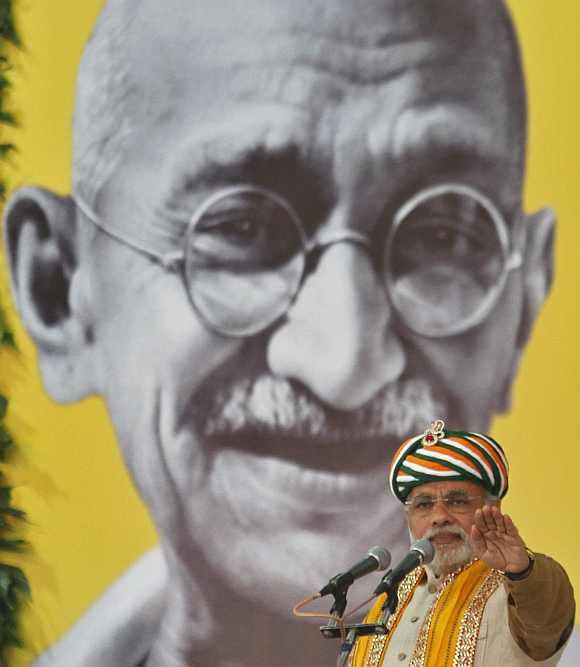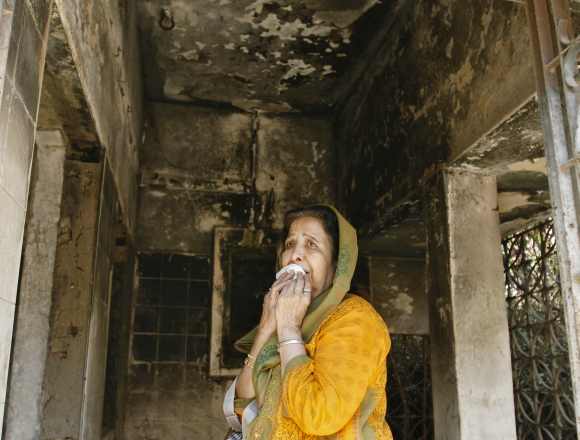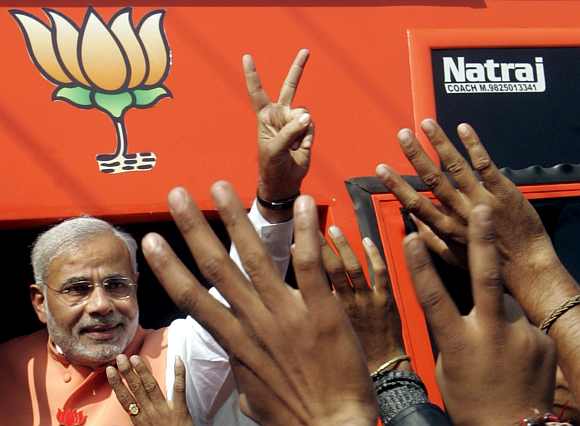 | « Back to article | Print this article |
'Gujarat gave us Gandhi, Sardar Patel but is synonymous with Modi'
Gujarat's isolation of Muslims is nothing new. The roots of this phenomenon lie in the Gujarat history of the last 1,500 years, opines Shreekant Sambrani
The media is awash with reminders and analyses of the riots that swept Gujarat a decade ago, following the Godhra train burning. The focal point of these reports is, almost invariably, Gujarat's chief minister then and for the decade since, Narendra Modi.
His many champions attribute to his leadership the genuine progress the state has made in this period and the reputation for clean administration it has earned. His vocal critics lay the blame for the riots at his doorstep and find his nonchalance infuriating.
The major casualty of this rather shrill debate is a historical context. Gujarat was among the earliest Asian regions to enjoy settled and developed culture, dating back to the Harappan era. Its traditions of industry and trade are evident throughout Indian history -- and in the last 300 years, elsewhere as well. The region that gave India Mahatma Gandhi, Sardar Patel and, yes, even Quaid-e-Azam Jinnah -- they all shaped the history of the subcontinent -- is now treated as being synonymous with its present leader by both fans and critics of Modi.
Gujarat existed as a state of the Indian Union for over four decades before the advent of Modi on its political scene. Modi may be the longest-serving chief minister of Gujarat, but he is one among 14 who have occupied that chair. His predecessors include illustrious individuals such as Jivraj Mehta, Hitendra Desai and Babubhai Jasbhai Patel as well as those with less savoury reputations such as Chimanbhai Patel, Amarsinh Chaudhari and Shankarsinh Vaghela, cutting across the political spectrum.
Click NEXT to read further...
For Rediff Realtime News click here
'Every Eden has a serpent, in Gujarat it's antipathy to Muslims'
Most other parameters of Gujarat's progress also exist in a continuum, rather than as splendid quantum jumps in the last decade. Ever since the state's inception in 1960, Gujarat's per capita income has been consistently among the top four of all Indian states. The state has followed enlightened industrialisation policies right from 1960 onwards. Its leadership was acutely conscious of the need to attract investment away from Mumbai and went all out to do so.
Gujarat Industrial Investment Corporation and Gujarat Industrial Development Corporation, both state government enterprises, pursued industrialists by offering them investment incentives and ready infrastructure. They were so successful in the state-sponsored development era of the 1970s and 1980s as to be held out as models to their counterparts in other states, which had records that were mostly abysmal.
Almost all Gujarat cabinets have been small and cohesive. Bureaucrats have been treated with respect and provided adequate space for action. Despite occasional rogue elements, the Gujarat administration has never had any odour attached to it.
The earthly paradise that the present rulers of Gujarat claim it to be has thus existed for a long time. And every Eden must have a Serpent. In the case of Gujarat, that happens to be the antipathy to Muslims.
'Stain of Godhra carnage continues to colour Gujarat panorama'
Analysing the 2007 Assembly election results, I had observed, "The isolation and sidelining of Muslims in Gujarat did not begin with the ascendancy of Modi or the Bharatiya Janata Party. The roots of this phenomenon lie in the Gujarat history of the last 1,500 years. The paradox [is] of the otherwise mild, gentle Gujarati, characterised by his pursuit of commerce to the exclusion of all else, displaying strong, almost rabid, prejudices against Muslims... The Gujarati has ... never accepted Muslims as a part of his society... This should explain, though not justify, the eruption of rage post Godhra"
The stain of the events ten years ago continues to colour the Gujarat panorama not because the critics keep harping on it, but because the dye threatens to become indelible. To paraphrase the Bard, not all the sweet successes of Gujarat can mask the odour of those horrific days.
To get on with development, the past has to be put behind. That does not mean hiding it in a dark cupboard, but rather acknowledging it and expressing remorse for the patently unjustifiable acts. But just as the development scenario has continued to unfold in a continuum, so does this aberration of the collective Gujarati consciousness.
'Modi, a product of evolving Gujarat culture not devil incarnate'
In 2012, there is no more a sign of regret for the post-Godhra riots in everyday Gujarat than there was in its immediate aftermath in 2002. Modi's role in these events needs to be seen in this light. He is a product of the evolving Gujarati culture and not the devil incarnate that has made it malignant, as his vociferous critics would have us believe.
Modi is unusually articulate and quick to grasp crucial issues, as even his worst critics would have to admit after listening to him. I had said in 2007: "The fact that the BJP under Modi has won Gujarat hands down in 2007 does not make the outcome any less democratic, and the fact that they won democratically does not make them any less worthy of moral opprobrium" ("Can we learn anything from Gujarat?", December, 26, 2007). That conclusion must hold as long as Modi and the BJP continue to win in Gujarat and do not express regret.
I have lived in Gujarat for four decades. It is the only place I call home, though I was not born here. I have been proud to call myself a Gujarati. I had confidently predicted that Gujarat would emerge even more vibrant after the killer earthquake sooner than expected, as it has from severe droughts, dam bursts and the plague, calamities that would have overwhelmed a lesser people. I have long worked with politicians, bureaucrats, businesses, institutions, social organisations and numerous individuals. I can no more point a finger at them than at myself for the last decade. I have no answer, and never will, as to what I did to stop the mayhem in 2002. The optimist that I am, I believed those were aberrant acts.
Reactions of some bright, sensitive young people to drafts of this column show that scars of 2002 are already fading. I believe them for all our collective selves and tomorrows. My optimism, though feeble, is not misplaced.
The other TOP photo features
Click on MORE to see another set of PHOTO features...





